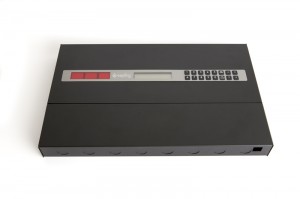Master Clocks – A Helpful Component for All Institutions
When you think of a master clock, what may come to mind is the enormous, rack mounted server rooms full of highly accurate time distributing equipment that only a military or space station would find useful. You may ask yourself, who else would need such accurate time in their facility? The term “master clock” sometimes sounds too hi-tech, or doesn’t sound like it belongs in smaller or less time sensitive institutions such as schools and hospitals. However, these institutions have been implementing master clocks into their buildings for years. Why? Because master clocks have the ability to distribute time to all other clocks within the system, which keeps every clock within the building displaying the exact same time—a feature that not only the military finds useful.
Master clocks are in fact extremely helpful to institutions of all kinds. Even some where most would assume having accurate time is not a big issue. This article will outline a few of those facilities that, more commonly than you think, utilize a master clock to increase efficiencies in their buildings.
1. Schools
Schools use master clocks to keep the organization and flow of the student body in order. For example, when the bells ring signaling students to change classes, those students are allowed a certain amount of time (usually five minutes) to travel from the previous class to the next. If students are looking at clocks with a time display inaccurate by five, four, or even three minutes, they could mistakenly show up late for class. However, when the school uses a master clock in their building, clocks are always correct, providing students and faculty with a seamlessly accurate time display. Students are no longer late to class and the overall functionality of the educational facility is improved.
2. Hospitals
A master clock can be a crucial component of the legal precautions a hospital must take in avoiding lawsuits. When a hospital operates under faulty wall clocks, implications of inaccurate record-keeping can surface, allowing patients to file suit against the hospital. For example, hospitals are obligated to administer medication to patients on a strict schedule. Going off this schedule can cause complications to the patient’s health. If the wall clocks within the hospital are all showing different, inaccurate time, nurses or doctors administering medication to the patient could make inconsistent records—proving the patient’s off-schedule medication may have caused additional illness or other complications. If a patient was victim to this kind of mistake and decided to file a malpractice suit against the hospital, the inaccurate records kept by the nurses and doctors could serve as valuable ammunition for the prosecution. In contrast, if a hospital has a master clock delivering accurate time to all the clocks in the building, issues like inaccurate record keeping are completely avoided.
Many think the master clock is a device only used in larger, more time-sensitive institutions. However, the smaller, more abundant institutions also find many ways to utilize the accurate time a master clock provides. From increasing the organization and flow of the facility to avoiding expensive law suits, master clocks have proven themselves a valuable component for institutions of all types.

